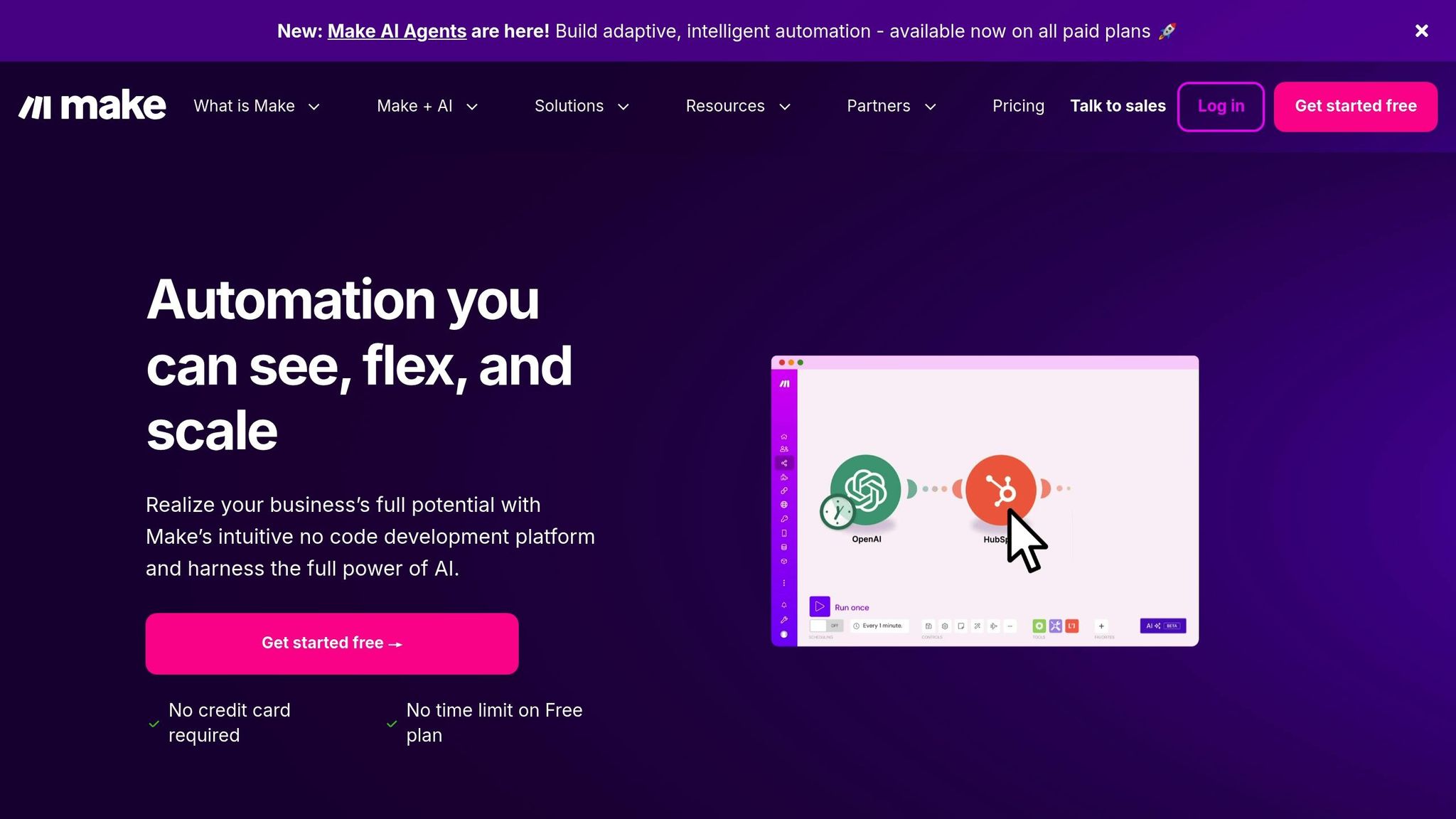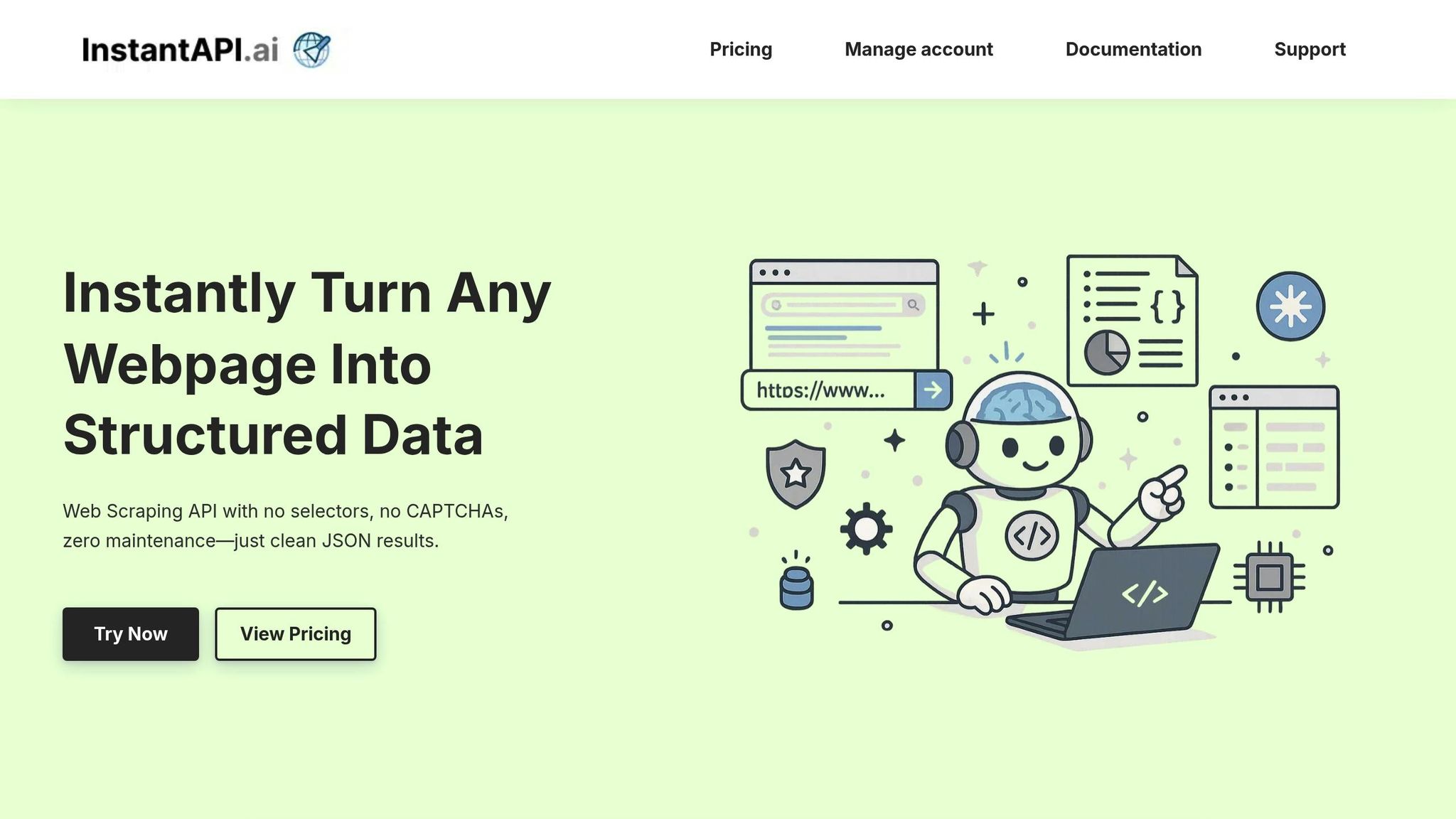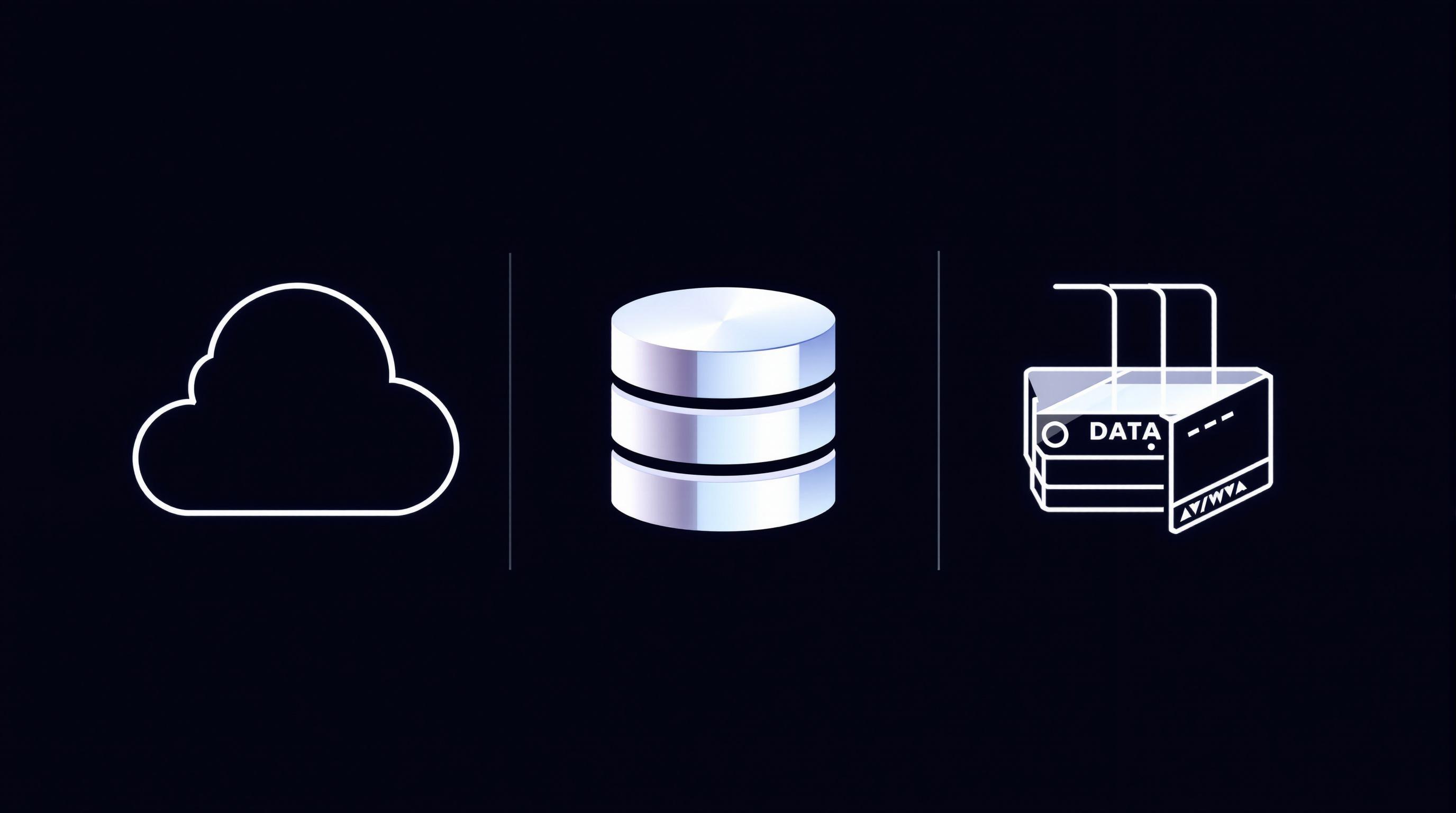Want to save time and stay ahead in publishing? Web scraping automates content collection, helping publishers gather data like book reviews, news articles, and bestseller lists quickly and efficiently. Here's what you need to know:
- What is Web Scraping? It's using tools to extract data from websites automatically, turning scattered online content into structured formats like spreadsheets or databases.
- Why It Matters for Publishers: Automates repetitive tasks, tracks industry trends, and provides insights into market performance - saving time and resources.
- Main Uses: Collecting book reviews, tracking bestseller lists, and aggregating industry news for better decision-making.
- Tools to Start: Platforms like InstantAPI.ai simplify scraping with features like CAPTCHA bypass, proxy rotation, and handling JavaScript-heavy sites.
- Legal Considerations: Always scrape publicly available data and follow copyright laws to avoid legal issues.
Web scraping is transforming publishing, enabling smarter, faster, and more informed decisions. Ready to dive in? Keep reading for tools, techniques, and tips to get started.
Automated News Scraping and Rewriting Workflow in Make.com

Main Uses of Web Scraping for Publishers
Publishers today are drowning in a sea of online content. The sheer volume of information available can be overwhelming, but web scraping turns this challenge into an opportunity. By automating the collection of data, publishers can save countless hours of manual effort while gaining insights that improve their workflows and decision-making. Here are three key ways web scraping is reshaping the publishing industry.
Collecting Book Reviews and Ratings
Book reviews and ratings are goldmines of market intelligence for publishers. Platforms like Goodreads, with its 125 million members and over 3.5 billion books shelved as of 2022, offer an abundance of data. Web scraping tools can extract reviews from sites like Goodreads, Amazon, and Barnes & Noble, enabling publishers to analyze the sentiment behind the 500,000 to one million books released annually. This helps them stay ahead of emerging trends.
For instance, ReviewGators scraped data from 890 books, pulling information from 18,875 URLs and analyzing 56,788 reviews. Such a scale of data collection would be impossible manually, yet it provides publishers with deep insights into what readers enjoy and why. By examining this data, publishers can pinpoint which genres are gaining traction and what themes resonate with audiences. These insights guide decisions on acquisitions and marketing strategies, ensuring that publishers stay aligned with reader preferences.
Collecting News Articles and Industry Reports
Staying updated on industry news and reports is just as important as understanding book reviews. The publishing landscape evolves rapidly, with new trends, acquisitions, and shifts happening daily. Web scraping automates the process of gathering news and reports, cutting down tasks that used to take hours - or even days - into mere minutes. This speed is essential for publishers who need to adapt quickly to market changes.
Kevin Sahin, Co-Founder of ScrapingBee, highlights the importance of web scraping for content professionals:
"Journalists should learn how the web works. Learning Python is a secret weapon in order to learn how to scrape the web. Thanks to its rich ecosystem, web scraping has never been so easy. Web scraping framework, data manipulation and visualization libraries, you name it!"
The demand for web scraping skills has surged, with global search interest increasing by 53% in the past five years. Tools like Google Sheets' =IMPORTHTML function offer a simple starting point, while more advanced users can turn to Python libraries like Beautiful Soup or Selenium for dynamic content scraping.
The ability to extract detailed data from a variety of sources gives publishers a competitive edge. They can monitor competitor activities, track industry reports, and aggregate news from multiple outlets, creating a strong foundation for articles and market analysis. This ensures they stay informed and ready to act on new opportunities.
Tracking Bestseller Lists
Bestseller lists provide real-time insights into market performance, making them invaluable for publishers. These lists influence decisions on acquisitions, marketing budgets, and overall strategy. Web scraping automates the process of tracking bestseller rankings across platforms, offering publishers instant access to critical data.
Amazon APIs, for example, allow publishers to pull data on top-selling books. This information goes beyond rankings, revealing trends in successful genres, themes, and pricing strategies. Publishers can analyze the top 50 bestselling books in specific categories to identify patterns, such as popular cover designs or optimal price points.
"In both publishing and retail, book datasets are a strategic multiplier - empowering data-driven decisions across acquisition, pricing, marketing, inventory, and content development." - SSA Group
By building dashboards, publishers can monitor performance metrics by title, format, and author, gaining a clearer picture of market trends and competitive positioning. This automated approach also supports pricing optimization and competitive intelligence. Publishers can track how competitors launch campaigns, adjust prices, and position their titles, enabling them to fine-tune their own strategies for maximum impact.
Web scraping transforms the tedious task of monitoring bestseller lists into an efficient, automated process. Instead of spending hours gathering data, publishers can focus on analyzing trends and making informed decisions that drive success.
Web Scraping Tools and Methods for Publishers
Automated content aggregation offers publishers immense potential, but to make the most of it, they need tools that balance technical capability with ethical considerations. The web scraping landscape has grown more advanced, with tools now able to handle everything from straightforward data extraction to navigating JavaScript-heavy websites. For publishers aiming to streamline their content aggregation, understanding these tools and methods is a must.
Getting Started with InstantAPI.ai

InstantAPI.ai makes web scraping accessible and efficient for publishers. With a success rate of over 99.99%, it’s an ideal choice for time-sensitive content aggregation. Unlike traditional methods that demand heavy coding, this platform delivers structured JSON data from any webpage using just a single API call.
Here’s how it works: publishers sign up for an API token, then use code examples in Python, JavaScript, or HTTP to initiate their first scrape. The platform’s standout feature is its ability to handle complex scenarios automatically. It manages proxy rotation through a network of 65+ million rotating IPs across 195 countries and bypasses CAPTCHAs seamlessly.
One of its most powerful features is custom data extraction. Publishers can define the data they need by creating a mock JSON object or schema, and InstantAPI.ai intelligently fills it with the relevant information. For instance, when gathering book reviews from multiple platforms, publishers can standardize fields like reviewer name, rating, review text, and publication date - regardless of how each website structures its content.
The pricing model is straightforward and flexible, charging $2 per 1,000 web pages scraped with no minimum spend. This pay-as-you-go approach lets publishers scale their scraping efforts based on actual needs, avoiding fixed monthly costs. Juan from Scalista GmbH sums it up perfectly:
"After trying other options, we were won over by the simplicity of InstantAPI.ai's Web Scraping API. It's fast, easy, and allows us to focus on what matters most - our core features."
While efficiency is key, publishers must also prioritize legal and ethical practices.
Following Legal and Ethical Scraping Rules
Even with advanced tools, staying compliant with legal guidelines is essential for sustainable operations. Publishers need to navigate copyright laws, terms of service, and privacy regulations carefully. Ethical scraping means accessing only publicly available data and respecting website policies.
Before scraping, publishers should review a website’s Terms of Service and check its robots.txt file (e.g., website.com/robots.txt) to understand which parts of the site are open to automated tools. Ignoring these guidelines can lead to legal issues or blocked access.
The Computer Fraud and Abuse Act (CFAA) provides further clarity. In the landmark hiQ Labs, Inc. v. LinkedIn Corp. case, the Ninth Circuit ruled that accessing publicly available data generally does not constitute unauthorized access under the CFAA. However, publishers should avoid collecting personally identifiable information (PII) unless absolutely necessary and ensure they have a legal basis for doing so. The Cambridge Analytica scandal serves as a cautionary tale about the risks of mishandling personal data.
To stay ethical and avoid overloading target websites, publishers should:
- Implement rate limiting for scraping requests.
- Use honest user agent strings that include contact details.
- Maintain detailed logs of scraping activities.
- Establish clear data retention policies and secure scraped data from unauthorized access.
Scraping Dynamic and JavaScript Websites
Modern websites often rely on JavaScript to load content dynamically, creating challenges for traditional scraping methods. These sites use AJAX to update content without reloading the page, which means standard HTTP requests might return incomplete results. Publishers need specialized techniques to scrape such environments effectively.
Headless browsers like Selenium and Playwright have long been popular for JavaScript-heavy sites. These tools simulate a browser environment, executing JavaScript and waiting for content to load before extracting data. While effective, they can be slow, resource-intensive, and require technical expertise.
InstantAPI.ai simplifies this process by using headless Chromium to render JavaScript automatically. Publishers can scrape dynamic content without managing browser instances or dealing with timing issues. This is especially useful for gathering data from modern book review sites, publishing dashboards, or social media platforms that rely heavily on JavaScript.
The platform also excels at handling pagination and infinite scroll, features common on publishing websites. For example, many book review platforms load additional content as users scroll. InstantAPI.ai navigates these structures automatically, ensuring publishers collect complete datasets rather than just the visible content.
For publishers working with geographically restricted content, InstantAPI.ai’s global geotargeting feature is invaluable. With access to 195+ countries, publishers can gather data from different regions, helping them analyze international trends or track global bestseller lists. This capability is crucial for understanding market dynamics across territories.
Additionally, the platform’s CAPTCHA bypass uses advanced human-like behaviors to ensure consistent access to data, even from sites with strong bot protections. This feature is essential for publishers who rely on regular data collection for market analysis and competitive insights.
sbb-itb-f2fbbd7
Common Problems and Solutions in Publishing Web Scraping
Web scraping can be a game-changer for publishers, offering automation on a massive scale. But with great potential comes a fair share of challenges. From legal hurdles to data accuracy and operational headaches, navigating these issues is key to running a successful content aggregation operation. Let’s dive into some of the most common problems and how publishers can tackle them.
Copyright Laws and Legal Requirements
Scraping copyrighted material without proper authorization can lead to serious consequences, including lawsuits. The Digital Millennium Copyright Act (DMCA) explicitly prohibits bypassing technological protections on copyrighted content or altering copyright information during scraping.
One high-profile example: In July 2023, comedian Sarah Silverman sued OpenAI, claiming her memoir, The Bedwetter, was used to train ChatGPT after being scraped from unauthorized online sources. This case highlights how even indirect use of scraped copyrighted material can spark legal battles.
The Computer Fraud and Abuse Act (CFAA) offers some guidance here. According to a ruling by the Ninth Circuit Court:
"It is likely that when a computer network generally permits public access to its data, a user's accessing that publicly available data will not constitute access without authorization under the CFAA."
This means publishers are safer when scraping publicly accessible data. To avoid legal trouble, focus on factual information like publication dates, rankings, and aggregated reviews instead of full-text content.
To stay compliant:
- Keep detailed records of your data sources and methods.
- Consult with legal experts to review your scraping practices.
- Use safeguards like output filters and agreements with data providers to avoid unauthorized use.
Ensuring Data Accuracy and Consistency
Legal compliance is just one part of the puzzle - your data also needs to be accurate and reliable. Large-scale scraping, especially from multiple sources, often leads to issues like outdated data, duplicate entries, and missing fields. Dynamic websites that frequently change layouts can further complicate things, causing scrapers to pull incomplete or incorrect information.
These problems can make your data unusable for decision-making. To fix this, consider:
- Implementing validation rules to ensure data meets quality standards.
- Cross-checking data with trusted sources, like comparing bestseller lists from multiple reputable outlets.
- Using AI and machine learning to spot inconsistencies.
- Setting up real-time monitoring to flag errors as they happen.
- Conducting regular audits to maintain long-term data integrity.
By combining these strategies, publishers can keep their data reliable, even as they scale up operations.
Managing Large-Scale Scraping Operations
Scaling up web scraping efforts comes with its own set of technical challenges. Issues like rate limiting, IP blocking, and anti-scraping mechanisms can disrupt operations. Websites often monitor request patterns, user agents, and IP addresses to detect and block scrapers. If you exceed acceptable request rates, your IP could get blacklisted, halting data collection altogether.
Handling proxy rotation and CAPTCHA challenges across hundreds or thousands of sources can also overwhelm internal teams.
Here’s how publishers can manage these challenges:
- Use distributed scraping to spread requests across multiple IPs and locations, reducing the load on individual sources and avoiding detection.
- Schedule scraping tasks during off-peak hours using serverless platforms like AWS Lambda or Google Cloud Functions to optimize resource use and lower costs.
- Implement automatic error recovery to address issues like blocked requests or failed scrapes without manual intervention.
- Set up comprehensive monitoring systems to track performance metrics like success rates, response times, and data quality in real time.
For publishers with large-scale operations, investing in advanced scraping tools with built-in monitoring and error detection features can save time and money. This allows technical teams to focus on higher-value tasks like content strategy, while the tools handle the heavy lifting of data collection.
Summary and Future of Automated Content Collection
Web scraping has evolved from a specialized skill into a critical tool for real-time data collection in publishing. It now supports everything from tracking bestsellers in real time to gathering comprehensive market insights.
Key Considerations for Publishers
To make the most of web scraping, publishers need to prioritize legal compliance, data quality, and operational efficiency. Staying compliant means using publicly available data and adhering to copyright laws, which is essential in an increasingly complex legal environment.
As operations grow, maintaining data accuracy becomes more challenging. Publishers can ensure reliability by cross-checking data from multiple sources, implementing robust validation processes, and using real-time monitoring systems. Investing early in infrastructure - like distributed scraping frameworks, automated error recovery systems, and advanced monitoring tools - can save time and money in the long run.
The value of internal scraping capabilities is reflected in high industry compensation, highlighting its importance for large publishers. With data becoming a key driver of competitive advantage, projections suggest that by 2025, 90% of large organizations will depend on external data for strategic decisions. Publishers who refine their automated content collection processes today are positioning themselves for long-term success.
Emerging Trends in Web Scraping Technology
The web scraping market is expanding rapidly. In 2024, it reached $1.01 billion, and it's expected to more than double to $2.49 billion by 2032. AI-driven scraping, in particular, is growing at an impressive pace, with its market size projected to jump from $886 million in 2025 to $4.37 billion by 2035, reflecting a 17.3% compound annual growth rate.
AI integration is already making a significant impact. Zyte reports that AI-related data requests now account for 5% of their pipeline, with an average deal value three times higher than traditional scraping projects. Additionally, the value of data-for-AI projects has increased by a staggering 400% year-over-year, signaling growing demand for advanced capabilities.
"Web scraping professionals are generally happy with the results of AI adoption. Thus, we might see a proliferation in AI and ML-based web scraping solutions for target unblocking, proxy management, parsing, and other tasks", says Julius Černiauskas, CEO of Oxylabs.
Looking ahead, web scraping is set to move beyond basic data extraction. Innovations like quantum-enhanced AI scrapers, self-learning autonomous crawlers, and federated learning-based privacy-preserving data harvesting are on the horizon. These advancements aim to tackle current challenges and improve the reliability of collected data.
However, websites are also ramping up their defenses. The number of web security services has grown significantly, rising from 36 in 2022 to 60 in 2024. This highlights the increasing difficulty of bypassing anti-scraping measures. Publishers that adopt AI-powered tools now will be better prepared to navigate these obstacles and maintain consistent data collection.
On the regulatory front, changes are happening fast. Denas Grybauskas, head of legal at Oxylabs, explains:
"As AI regulation matures and the first comprehensive AI law, the EU's AI Act, comes into power, we will see how different regulatory frameworks affect the development of AI and ML solutions in business and other areas. Lessons learned from practice might inform future lawmaking in the EU and jurisdictions that are yet to enact AI laws of similar scope."
To stay ahead, publishers should partner with vendors who emphasize compliance and transparency in their data sourcing practices. This proactive approach will be essential as new regulations continue to shape the industry.
FAQs
What steps should publishers take to ensure web scraping is legally compliant?
To ensure compliance with the law while using web scraping, it's crucial to follow a few important practices. Start by only gathering data that is publicly available and steer clear of violating any website’s terms of service. Always check the site’s robots.txt file to see if there are specific restrictions on scraping.
It’s equally important to respect copyright laws. Scraping copyrighted content without authorization can lead to legal troubles. To avoid this, either secure the necessary permissions or confirm that your use of the material qualifies under fair use provisions. Upholding ethical standards - like being transparent about how the scraped data will be used - can also reduce potential legal risks.
If you’re unsure about any aspect, seeking advice from legal experts familiar with data collection laws can provide clarity and help you navigate any regulatory complexities.
How can I ensure accurate and consistent data when scraping from multiple sources?
To keep your data accurate and consistent when scraping from multiple sources, start by setting up validation rules. These rules help ensure the data aligns with your quality standards. Regular audits are also key - review your datasets regularly to spot and fix errors or inconsistencies, keeping your information dependable over time.
Another important step is using data normalization techniques. These methods standardize formats across various sources, making it easier to integrate data seamlessly. Advanced scraping tools can be a big help here, as they’re equipped to handle dynamic content and process large datasets efficiently. Finally, keep an eye on your scraping processes. Regularly monitor and adapt to changes in website structures to ensure your data remains accurate and reliable in the long run.
What strategies can publishers use to handle challenges like IP blocking and CAPTCHA when scaling web scraping operations?
Publishers facing hurdles like IP blocking and CAPTCHA can overcome them with smart, well-planned strategies to keep web scraping efficient and scalable. To minimize the risk of IP blocking, consider using rotating proxies, which frequently change IP addresses to avoid detection. Pair this with rate limiting and varying request intervals to simulate natural browsing behavior - this can go a long way in preventing bans.
When it comes to CAPTCHAs, AI-powered tools or specialized CAPTCHA-solving services can be a game-changer. Many of these tools rely on optical character recognition (OCR) technology to decode CAPTCHAs while staying within legal boundaries. By combining these approaches, publishers can navigate these technical challenges and streamline their scraping efforts with greater ease.


